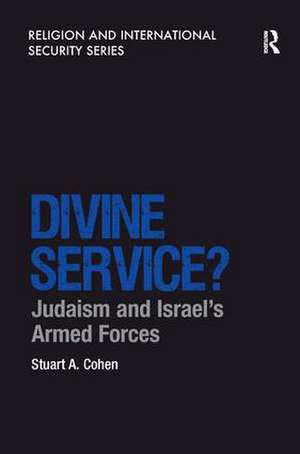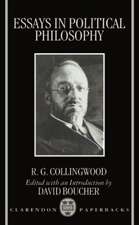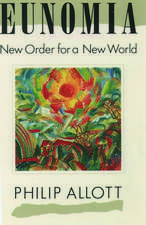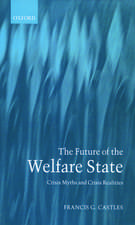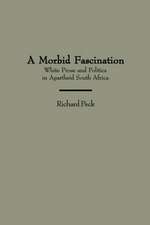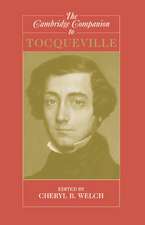Divine Service?: Judaism and Israel's Armed Forces: Religion and International Security
Autor Stuart A. Cohenen Limba Engleză Paperback – 28 noi 2016
| Toate formatele și edițiile | Preț | Express |
|---|---|---|
| Paperback (1) | 469.34 lei 6-8 săpt. | |
| Taylor & Francis – 28 noi 2016 | 469.34 lei 6-8 săpt. | |
| Hardback (1) | 1055.69 lei 6-8 săpt. | |
| Taylor & Francis – 28 iul 2013 | 1055.69 lei 6-8 săpt. |
Preț: 469.34 lei
Nou
Puncte Express: 704
Preț estimativ în valută:
89.81€ • 94.02$ • 74.31£
89.81€ • 94.02$ • 74.31£
Carte tipărită la comandă
Livrare economică 05-19 aprilie
Preluare comenzi: 021 569.72.76
Specificații
ISBN-13: 9781138271968
ISBN-10: 1138271969
Pagini: 216
Dimensiuni: 156 x 234 x 12 mm
Greutate: 0.45 kg
Ediția:1
Editura: Taylor & Francis
Colecția Routledge
Seria Religion and International Security
Locul publicării:Oxford, United Kingdom
ISBN-10: 1138271969
Pagini: 216
Dimensiuni: 156 x 234 x 12 mm
Greutate: 0.45 kg
Ediția:1
Editura: Taylor & Francis
Colecția Routledge
Seria Religion and International Security
Locul publicării:Oxford, United Kingdom
Notă biografică
Stuart Cohen (D.Phil. Oxford University 1972) is professor emeritus of political studies at Bar-Ilan University, Israel and chair of the department of government and politics at Ashkelon Academic College, Israel. Over the past two decades his research has focused on the overall interface between the military and society in Israel. He has also devoted particular attention to the specifically Jewish dimension of that subject.
Recenzii
’The history, as well as the structure and function, of Israel's Armed Forces, is characterized by many riddles. Not the least of them is the question of how did the ’"people of the Book" turn into a "nation in arms"? This scholarly book sheds light on this and many other paradoxes existing presently in the Israeli military.’ Reuven Gal, Founding Chair of The Israeli Association for Civil-Military Studies ’Stuart A. Cohen is Israel’s leading student of civil-military relations, and he has long written with great insight, and often provocatively, on the ever-changing place of religion in the army of the Jewish state. This wide-ranging and elegantly-written collection shows how unique Cohen is in bringing together deep knowledge of the Israel Defense Forces, mastery of the Jewish tradition, and sensitivity to the contemporary Israeli scene. A must-read for those concerned about the past, present, and future not only of the IDF, but of Israel.’ Ronald R. Krebs, University of Minnesota, USA 'Stuart Cohen, a full professor at Israel’s Bar Ilan University, and who recently became the head of the Politics and Governance department at the Academic College of Ashkelon, is not only one of Israel’s leading civil-military relations scholars, but perhaps the leading academic authority on halachah scholarship on warfare. He has produced a concise, comprehensive, reader-friendly introduction to the Israeli case study... an authoritative and comprehensive work... Overall, it is a magnum opus, since he manages to summarise decades of work and provide an unrivalled introduction to an important topic.' Defense and Security Analysis 'Thorough in its sources, lucid in its presentation, and balanced in its analysis, this text brings together some of Cohen’s most influential publications as well as novel work. ... This responsa literature is Cohen’s greatest area of expertise, and he offers a broad survey and a careful evaluation of prominent texts in that literary
'An introduction that weaves together all three parts of the anthology, as well as an epilogue that addresses the vexing problem of Haredi (non)enlistment in the IDF and its implications for Israeli society, round out the volume, whose rich contents have barely been scratched in this brief review. Suffice it to say here that Cohen’s anthology is a most important contribution to the field of military sociology in respect of the IDF, and, as such, it deserves a very wide audience.'
David Rodman, Israel Affairs
'An introduction that weaves together all three parts of the anthology, as well as an epilogue that addresses the vexing problem of Haredi (non)enlistment in the IDF and its implications for Israeli society, round out the volume, whose rich contents have barely been scratched in this brief review. Suffice it to say here that Cohen’s anthology is a most important contribution to the field of military sociology in respect of the IDF, and, as such, it deserves a very wide audience.'
David Rodman, Israel Affairs
Cuprins
Chapter 1 Judaism in the IDF: Parameters, Dynamics and Paradoxes; Part I The Legacy of Ambivalence; Chapter 2 Reversing the Tide of Jewish History: Culture and the Creation of Israel’s ‘People’s Army’; Chapter 3 Between the Transcendental and the Temporal: Security and the Religious Jewish Community in Israel; Part II Adaptations and their Price; Chapter 4 The Hesder Yeshivot in Israel: A Church-state Military Arrangement; Chapter 5 ‘The Lord is a Man of War: The Lord is His Name’ (Exodus 15:3). The Use of Religious Motifs in Contemporary Orthodox Jewish Perceptions of Military Activities in Israel; Chapter 6 The Re-Discovery of Orthodox Jewish Laws Relating to the Military and War ( dinei tzavah u-milkhamah ) in Contemporary Israel: Trends and Implications; Part III Tensions – and their Resolution?; Chapter 7 Tensions between Military Service and Jewish Orthodoxy in Israel: Implications Imagined and Real; Chapter 8 Religion as a Nation-binder and Nation-divider: Interpersonal Relationships in the Israel Defense Forces; Chapter 9 Warfare in Contemporary Jewish Law: Varieties of Analytical Frameworks; Chapter 10 Epilogue: From Haredi Non-enlistment to an All-volunteer IDF?;
Descriere
Soldiering, which for almost two millennia was almost entirely foreign to Jewish thought and practice, has by virtue of universal conscription become a rite of passage to citizenship in the Jewish state. For practicing orthodox Jews in Israel this change generates dilemmas that are intellectual as well as behavioural, and has necessitated both doctrinal and institutional adaptations. At the same time, the responses thus evoked are forcing Israel's decision-makers to reconsider the traditional role of the Israel Defence Force (IDF) as their country's most evocative symbol of national unity.
